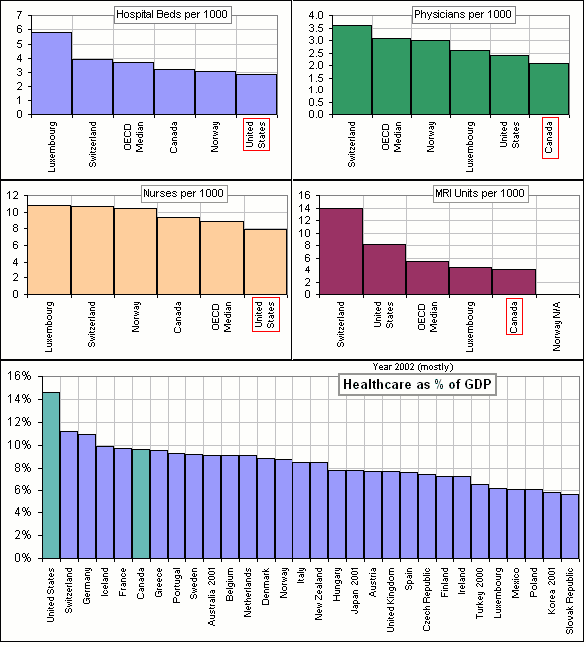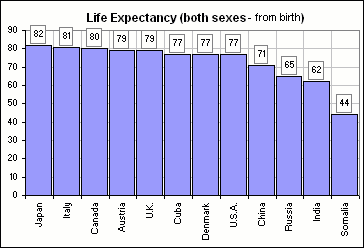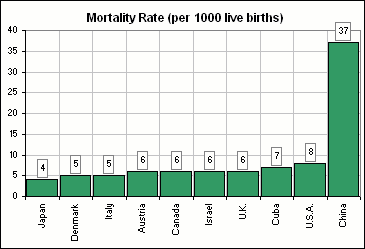| World Health Report ... a la World Health Organization |
There I was, watching Cuba beat the Dominican Republic in the 2006 World Classic Baseball competition, and I thought about the Cuban healthcare system
which has received both positive and negative reviews by various agencies around the world.
In particular, there has been much criticism of the offer made by
Fidel Castro:
We are prepared to grant a number of scholarships to poor youth who cannot afford to pay the $200,000 it costs to get a medical degree in the US. Cuba is offering 250 full scholarships per year for students in under served communities in the United States to study medicine in Cuba. Tuition, dormitory room and board, and textbooks are free of charge.
>So, isn't there an unbiassed agency that ...?
My thought exactly, so I looked at the 2005 WHO report and found it quite interesting.
>But haven't you done healthcare stuff before?
Yes, here where we generated a few charts
(for year 2002), like so:

>So, are we supposed to feel proud ... that our healthcare system is so great?
Uh ... I found this summary of the 2000 WHO report,
where, among the 191 WHO member states, a "ranking" said:
- France provides the best overall health care followed among major countries by Italy, Spain, Oman, Austria and Japan.
- Several small countries – San Marino, Andorra, Malta and Singapore - are rated close behind second- placed Italy.
- Most of the lowest placed countries are in sub-Saharan Africa where life expectancies are low. HIV and AIDS are major causes of ill-health.
- The U. S. health system spends a higher portion of its gross domestic product than any other country but ranks 37... and Cuba ranks 39th.
- Canada's rank was 30.

Of course. WHO’s assessment system was based on five indicators:
- Overall level of population health.
- Health inequalities (or disparities) within the population.
- Overall level of health system responsiveness (a combination of patient satisfaction and how well the system acts).
- Distribution of responsiveness within the population (how well people of varying economic status find that they are served by the health system).
- The distribution of the health system’s financial burden within the population (who pays the costs).
- The nations with the most responsive health systems are the United States, Switzerland, Luxembourg, Denmark, Germany, Japan, Canada, Norway, Netherlands and Sweden.
- In North America, Canada rates as the country with the fairest mechanism for health system finance – ranked at 17-19, while the United States is at 54-55.
- Cuba is the highest among Latin American and Caribbean nations at 23-25.
|
>What about that 2005 report?
Here are some (random) excerpts:
and some info for each member state is here. >How come you got the years all mixed up? Year 2000, year 2005, year ...
| Ranking: 2000 Sweden Norway Australia Canada France Germany Spain Finland Italy Denmark Netherlands Greece Japan Austria New Zealand United States Ireland United Kingdom Portugal |
A recent (May, 2006) report of the Journal of the American Medical Association noted the large disparity between the English and American "health".
There seemed to be no obvious reason for this, like lack of universal medical coverage in the U.S. (unlike the situation in England) or obesity, stress, etc..
The report noted that:
Overall, rates of self-reported disease were consistently and significantly higher among Americans than the English
- Diabetes: Americans: 12.5%, English: 6.1%
- Hypertension: Americans: 42.4%, English: 33.8%
- All heart disease: Americans: 15.1%, English: 9.6%
- Myocardial infarction: Americans: 5.5%, English: 4%
- Stroke: Americans: 3.8%, English: 2.3%
- Lung disease: Americans: 8.1%, English: 6.3%
- Cancer: Americans: 9.5%, English 5.5%
See also JAMA Report
See WHO
2006 Health report
2005 ranking
comments on the 2000 report
comments on U.S. healthcare
a U.S. response in PDF format
Canadian healthcare
another U.S. response to the 2000 report
C.N.N. article on infant mortality
U.S. Life Expectancy and healthcare costs
Preventable Deaths and its cost to U.S. healthcare
These projected figures show that ... approximately 56 percent of the population of the United States have been treated unnecessarily ...
Canada vs U.S. a Harvard Medical School study
and Canada, eh?




